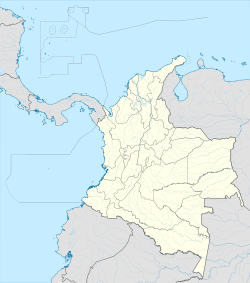Guaduas
|
Villa de Guaduas Villa de San Miguel de las Guaduas |
|||
|---|---|---|---|
 |
|||
|
|||
| Nickname(s): Guaduas | |||
| Motto: Confianza y Desarrollo | |||
 Location of the town and municipality of Guaduas in Cundinamarca Department. |
|||
| Location in Colombia | |||
| Coordinates: 5°4′10″N 74°35′53″W / 5.06944°N 74.59806°WCoordinates: 5°4′10″N 74°35′53″W / 5.06944°N 74.59806°W | |||
| Region | Andean Region | ||
| Department | Cundinamarca | ||
| Province | Bajo Magdalena | ||
| Settled around | 1549 | ||
| Established | December 13, 1610 | ||
| Founded | December 27, 1644 | ||
| Government | |||
| • Type | Municipality | ||
| • Mayor | Doris Acero de Vera | ||
| Elevation | 992 m (3,255 ft) | ||
| Population (2005) | |||
| • Total | 33,000 | ||
| Demonym(s) | guadeño, -ña (es) | ||
| Website | http://www.villadeguaduas.gov.co | ||
Guaduas (Spanish pronunciation: [ˈɡaðwas]) is a town in Colombia, in the Lower Magdalena Province department of Cundinamarca, about 117 km from Bogotá. It is an agricultural and tourist center of some importance with a population of about 33,000. Its name refers to a type of bamboo cane. It is one of the cities on the Bogotá-Medellín highway. Its main plaza is featured on the Colombian ten-thousand pesos bill, and is one of the seats of the Roman Catholic Diocese of La Dorada–Guaduas
The early inhabitants of the "Valley of the Guaduas" were the indigenous Panche people. It was an important stop on the road from Santa Fe (now Bogotá) to Honda, located in a small, fertile valley. The town proper was founded on April 20, 1572 by Andrés Díaz Venero de Leiva. It was abandoned after its foundation until December 13, 1610, when Fray Tomas de Morales founded the Franciscan monastery of La Soledad on the same location. It was recognized officially as a villa on December 27, 1644 and formally re-founded by Francisco Pérez de Guzmán.
In 1696, Guaduas became a parish seat, thanks to a charter from King Charles II. The convent was closed around 1805. In 1809 Fray Domingo de Petres, a Capuchin architect who also directed the construction of the Cathedral of Bogotá, began building a church in the village. The original convent building was subsequently transformed into a prison by order of the Congress of Cucuta.
Guaduas was a center of botanical experimentation, which included the introduction of níspero trees from the West Indies in the late 18th century. The crop is now widely cultivated in the region.
...
Wikipedia



